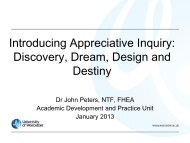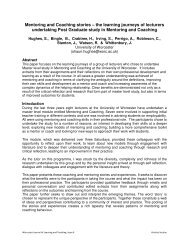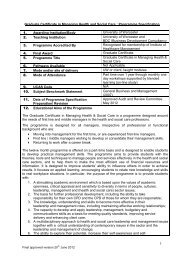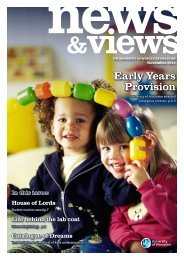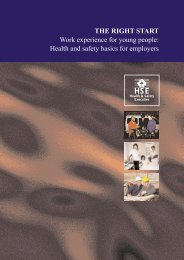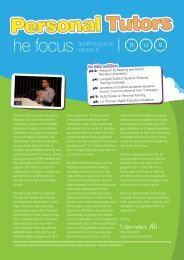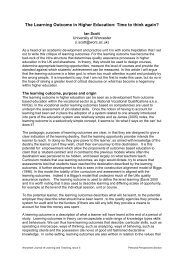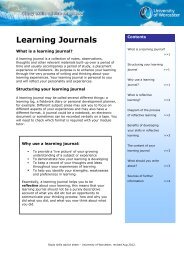380 D. J. Brooker & R. J. WoolleyAnother manager of one of the homes emphasisedthe necessity <strong>for</strong> regular communication betweenthe Locksmith and the manager:‘‘I think there needs to be a structured periodof ...supervision. You need to have that importantlinking together, whether it be just <strong>for</strong> an hour oran afternoon together to work on something. Butinvaluable I would say, keep your Locksmithonboard, keep you onboard, work together at theteam ...’’Part of the reason that the Enriched OpportunitiesProgramme remained high on the managementagenda was the fact that it was a research projectand that a lot of attention was focused on the results.<strong>The</strong> challenge is how Enriched Opportunitiesmaintains management focus <strong>with</strong>out this. <strong>The</strong>idea of having a senior coach specifically identified<strong>with</strong>in the organisation who could mentor theprocess at a management level and provide someof the arms length supervision to the Locksmithwas seen as a possible solution to keeping thefocus on this programme once the research phasehas ended.By and large there was recognition at finalmeasures that the management and organisation ofcare meant that staff felt proud to part of a cuttingedgeorganisation. This is a positive spin-off <strong>for</strong>management who want to improve job satisfactionand retain staff. One member of staff said:‘‘Compared to other places I’ve worked theresidents seem more happy here than anywhereelse I’ve worked. And the staff seem to knowthem better as well; they know them asindividuals and not as a resident or a problem,or whatever.’’<strong>The</strong> EWG thought there needed to be anexternal recognition through the inspection processof the impact of this work on the lives of veryvulnerable residents, if it were to be maintainedin the long term. It has already achieved positivespin offs <strong>for</strong> inspections, particularly in onenursing home when the manager was describingtheir latest inspection:‘‘It was absolutely fantastic, she said, yeah. She’dmet <strong>with</strong> the residents, she met <strong>with</strong> the staff,she met <strong>with</strong> the volunteers, she’d looked atour paperwork and she just couldn’t believehow good it was. She just said, ‘‘What I’m actuallymeasuring now <strong>for</strong> my documentation is justso trivial.’’ You know, she said, ‘‘I don’t reallythink that this is probably going to be appropriate<strong>for</strong> here.’’Challenges<strong>The</strong>re are a number of challenges that remainabout the Enriched Opportunities Programme.Involving family carers in the process of EnrichedOpportunities was something that was seen asan important aspect from the outset andsomething that requires further development. As<strong>with</strong> engaging family members, working <strong>with</strong>volunteers was an aspect of the programme thatrequired further work. <strong>The</strong>re was a wish <strong>for</strong> morevolunteers to spend more one-on-one time <strong>with</strong><strong>people</strong> <strong>with</strong> <strong>dementia</strong>.<strong>The</strong>re was a theme about ensuring that managementand staff teams shared the same vision <strong>for</strong> theprogramme. <strong>The</strong>re were still concerns at the end ofthe intervention that the emphasis on activity meantthat some of those <strong>with</strong> more advanced <strong>dementia</strong>might be given inappropriate things to do.One of the challenges in the extra carehousing scheme was ensuring that those on theEnriched Opportunities Programme were not stigmatised.This quote from the Locksmith about howtenants viewed her, suggests this was achievedalthough the mechanisms <strong>for</strong> this need clarifying.‘‘<strong>The</strong>y just see me as a staff member, it’s, I have tosay I’m amazed at the amount of <strong>people</strong> thathaven’t actually said, ‘‘What do you do?’’ BecauseI think that’s all to do <strong>with</strong> the approach I had atthe beginning, that I worked <strong>with</strong> the staff team, Iwent on the floor as a carer. <strong>The</strong>y see me as anoffice person, because I’ve been in the office doingpaperwork and stuff, so nobody’s quite sure,I don’t think. And they’ve never tackled me as‘‘Why, why are you here? Why you do the things<strong>with</strong> us?’’ I just say, ‘‘I’m here and I’m doing allthe fun things.’’ And I have made it fun.’’<strong>The</strong> manager commented on how it appeared tovisitors:‘‘We’ve had some visitors here this morning andwe’ve been down there. And the one visitor didask about <strong>dementia</strong> and how we cope, you know,but he wasn’t aware that there was anybody in thatgroup who was part of a project group who hadbeen, who’d got <strong>dementia</strong> or, you know, just atotal integration, merger, nothing stood out. Andit wasn’t introduced as anything special, youknow, this is an ordinary Thursday at MapleCourt and this is an ordinary range of activitiesthat are going on.’’One of the major challenges was in helping the teamdeal <strong>with</strong> competing priorities on their time. Staffwere aware of competing demands and sometimesfelt unclear about their priorities. Lack of staff timewas mentioned at all stages of the project and inevery facility as being a barrier to achieving fulfilledlives <strong>for</strong> <strong>people</strong> <strong>with</strong> <strong>dementia</strong>.It is a long day, it is a long day, there are notenough hours in that day to try and fit everythingin that you would like because it is just a routineisn’t it?
<strong>Enriching</strong> <strong>opportunities</strong> <strong>for</strong> <strong>people</strong> <strong>living</strong> <strong>with</strong> <strong>dementia</strong> 381DiscussionDuring this research and development we identifiedan evidence base <strong>for</strong> all of the elements of theEnriched Opportunities Programme. Many lessonshave been learnt from the literature, the expertworking group and the action research about theprovision of the Enriched OpportunitiesProgramme. As a result of this work we now havea much clearer idea of what the different elements ofthe Enriched Opportunities Programme look like inpractice. It has moved from a theoretical ideal to apractical working model. We have a clear idea ofthe assessment process, the provision of activityand occupation, the person specification andjob description of the Locksmith, the role andresponsibilities of the Locksmith, the staff teamand the management team, staff training needs andissues to do <strong>with</strong> management and leadership.<strong>The</strong> strength of <strong>The</strong> Enriched OpportunitiesProgramme lies in the triangulation of evidence <strong>for</strong>each element of the programme from the publishedliterature, expert opinion and from feedback frompractice. Its limitations lie in its possible narrownessof focus – in that it could be argued that eachevidence base was significantly contaminated by theother. <strong>The</strong> other major weakness is the enormousHawthorne effect in this type of research. It could beargued that had any care provider found themselvesunder such scrutiny from the EWG, that this in itselfwould have radically changed practice.This evaluation was carried out <strong>with</strong> a careprovider that already has in place a number ofelements that would be seen as markers of goodpractice. Whether this model is transportable toother providers <strong>with</strong> more variable standards of careis a question that requires further research. Researchmethodologies <strong>for</strong> understanding the impact ofmulti-level interventions such as this are notstraight<strong>for</strong>ward. <strong>The</strong>re are many variables to do<strong>with</strong> the micro-environment of a care facility thatcan strongly affect outcomes in this area. One of theproblems <strong>with</strong> researching a multi-level interventionis being able to ensure that it is carried out in astandardised and uni<strong>for</strong>m manner. In this currentevaluation we set out the broad parameters of theEnriched Opportunities Programme as described bythe EWG and collected qualitative data to help buildthe optimal programme. We now have a clearerintervention that could be applied in a number ofservice settings <strong>with</strong>in a more rigorous researchdesign to test its efficacy.AcknowledgementsThanks to all the residents, tenants and staff atExtraCare Charitable Trust who gave so generouslyof their time. Thanks to all those in the ExpertWorking Group who shaped and guided thisdevelopment.ReferencesAldridge, D. (2000). Music <strong>The</strong>rapy in Dementia Care. London:Jessica Kingsley.Allan, K., & Killick, J. (2000). Undiminished possibility: <strong>The</strong> artsin <strong>dementia</strong> care. Journal of Dementia Care, 8, 16–17.Baker, R., Holloway, J., Holtkamp, C. C. M., Larsson, A.Hartman, L. C., Pearce, R., Scherman, B., Johansson, S.,Thomas, P. W., Wareing, L. A., & Owens, M. (2003). Effectsof multi-sensory stimulation <strong>for</strong> <strong>people</strong> <strong>with</strong> <strong>dementia</strong>. Journalof Advanced Nursing, 43, 465–477.Ballard, C., O’Brien, J. T., Reichelt, K., & Perry, E. (2002a).Aromatherapy as a safe and effective treatment <strong>for</strong> themanagement of agitation in severe <strong>dementia</strong>: <strong>The</strong> results of adouble blind, placebo-controlled trial <strong>with</strong> Melissa. Journal ofClinical Psychiatry, 63, 553–558.Ballard, C., Powell, I., James, I., Reichelt, K., Myint, P.,Potkins, D., et al. (2002b). Can psychiatric liaison reduceneuroleptic use and reduce health service utilization <strong>for</strong><strong>dementia</strong> patients residing in care facilities? InternationalJournal of Geriatric Psychiatry, 17, 140–145.Bartels, S. J., Moak, G. S., & Dums, A. R. (2002). Mental HealthServices in Nursing Homes: Models of Mental Health Servicesin Nursing Homes: A Review of the Literature. PsychiatricServices, 53, 1390–1396.Batson, P. (1998). Drama as therapy: Bringing memories to life.Journal of Dementia Care, 6, 19–21.Beck, C. (2001). Identification and assessment of effectiveservices and interventions: <strong>The</strong> nursing home perspective.Aging and Mental Health, 5, 99–111.Brooker, D. (2001). <strong>Enriching</strong> lives: Evaluation of the Extracareactivity challenge. Journal of Dementia Care, May/June, 9, 33–37.Brooker, D., & Woolley, R. (Eds.), (2003) <strong>The</strong> EnrichedOpportunities Project: Transcripts of the Expert Working GroupInitial meeting 2002. Brad<strong>for</strong>d: University of Brad<strong>for</strong>d.Brooker, D., Woolley, R., & Lee, D. (2007). <strong>The</strong><strong>Enriching</strong> Opportunities Programme: An evaluation of amulti-level activity based model of care. Aging and MentalHealth, 11, 370–382.Camp, C. J., & Skrajner, M. J. (2004). Resident-AssistedMontessori Programming (RAMP): Training Persons WithDementia to Serve as Group Activity Leaders. <strong>The</strong>Gerontologist, 44, 426–431.Cantley, C. (2001). Understanding <strong>people</strong> in organisations.In C. Cantley (Ed.), A Handbook of Dementia Care(pp. 220–239). Buckingham: Open University Press.Chaudhury, H. (2003). Remembering Home Through Art.Alzheimer, 4, 119–124.Cheston, R. (1998). Psychotherapeutic work <strong>with</strong> <strong>people</strong> <strong>with</strong><strong>dementia</strong>: A review of the literature. British Journal of MedicalPsychology, 71, 211–231.Chung, J. C. C., & Lai, C. K. Y. (2002). Snoezelen <strong>for</strong> <strong>dementia</strong>(Cochrane Review). <strong>The</strong> Cochrane Database of SystematicReviews, Issue 4.Coaten, R. (2001). Exploring reminiscence through dance andmovement. Journal of Dementia Care, 9, 19–22.Cody, M., Beck, C., & Svarstad, B. L. (2002). Mental HealthServices in Nursing Homes: Challenges to the Use ofNonpharmacologic Interventions in Nursing Homes.Psychiatric Services, 53, 1402–1406.Cohen-Mansfield, J. (2005). Nonpharmacological Interventions<strong>for</strong> Persons <strong>with</strong> Dementia. Alzheimer, 6, 129–145.Cole, R. P., Scott, S., & Skelton-Robinson, M. (2000). <strong>The</strong> effectof challenging behaviour and staff support on the psychologicalwellbeing of staff working <strong>with</strong> older adults. Aging and MentalHealth, 4, 359–365.



